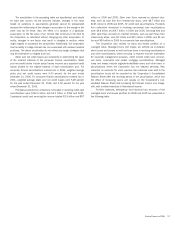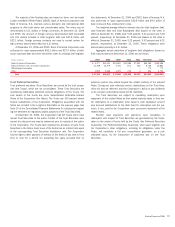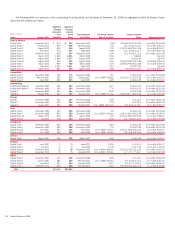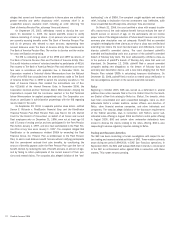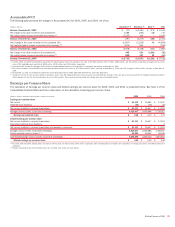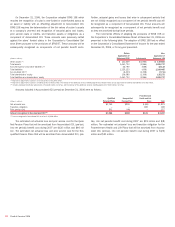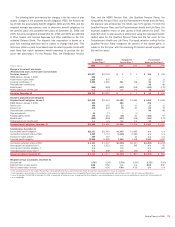Bank of America 2006 Annual Report Download - page 131
Download and view the complete annual report
Please find page 131 of the 2006 Bank of America annual report below. You can navigate through the pages in the report by either clicking on the pages listed below, or by using the keyword search tool below to find specific information within the annual report.what the timing of the ultimate resolution of these matters will be, or what
the eventual loss, fines or penalties related to each pending matter may
be.
In accordance with SFAS No. 5, “Accounting for Contingencies”, the
Corporation establishes reserves for litigation and regulatory matters when
those matters present loss contingencies that are both probable and
estimable. When loss contingencies are not both probable and estimable,
the Corporation does not establish reserves. In some of the matters
described below, including but not limited to a substantial portion of the
Parmalat Finanziaria S.p.A. matters, loss contingencies are not both prob-
able and estimable in the view of management, and, accordingly, reserves
have not been established for those matters. Based on current knowledge,
management does not believe that loss contingencies, if any, arising from
pending litigation and regulatory matters, including the litigation and regu-
latory matters described below, will have a material adverse effect on the
consolidated financial position or liquidity of the Corporation, but may be
material to the Corporation’s operating results for any particular reporting
period.
Adelphia Communications Corporation
Bank of America, N.A. (BANA), Banc of America Securities (BAS), Fleet
National Bank and Fleet Securities, Inc. (FSI) are defendants in an adver-
sary proceeding brought by the Official Committee of Unsecured Creditors
(the Creditors’ Committee) on behalf of Adelphia and Adelphia as
co-plaintiffs that had been pending in the U.S. Bankruptcy Court for the
Southern District of New York (the Bankruptcy Court). The lawsuit names
over 400 defendants and asserts over 50 claims under federal statutes,
including the Bank Holding Company Act, state common law, and various
provisions of the Bankruptcy Code. The plaintiffs seek avoidance and
recovery of payments, equitable subordination, disallowance and
re-characterization of claims, and recovery of damages in an unspecified
amount. The Official Committee of Equity Security Holders of Adelphia
intervened in this proceeding and filed its own complaint, which is similar
to the unsecured creditors’ committee complaint and also asserts claims
under RICO and additional state law theories. BANA, BAS and FSI have
filed motions to dismiss both complaints. On February 9, 2006, the U.S.
District Court for the Southern District of New York overseeing the Adel-
phia securities litigation granted the motions of the adversary defendants
to withdraw the adversary proceeding from the Bankruptcy Court, except
with respect to the pending motions to dismiss. On January 5, 2007, the
Bankruptcy Court entered an order confirming a plan of reorganization of
Adelphia and its subsidiaries, which provides that, effective on Febru-
ary 13, 2007, the adversary proceeding will be transferred to a liquidating
trust created under the plan.
In re Initial Public Offering Securities
Beginning in 2001, Robertson Stephens, Inc. (an investment banking
subsidiary of FleetBoston that ceased operations during 2002), BAS, other
underwriters, and various issuers and others, were named as defendants
in certain of the 309 purported class actions that have been consolidated
in the U.S. District Court for the Southern District of New York as In re Ini-
tial Public Offering Securities Litigation. The plaintiffs contend that the
defendants failed to make certain required disclosures and manipulated
prices of IPO securities through, among other things, alleged agreements
with institutional investors receiving allocations to purchase additional
shares in the aftermarket and seek unspecified damages. On October 13,
2004, the district court granted in part and denied in part plaintiffs’
motions to certify as class actions six of the 309 cases. On December 5,
2006, the U.S. Court of Appeals for the Second Circuit (the Second Cir-
cuit) reversed the district court’s class certification order. The plaintiffs
have petitioned the Second Circuit to reconsider its ruling. That petition is
pending. The district court stayed all proceedings pending a decision on
the petition.
On February 15, 2005, the district court conditionally approved a
settlement between the plaintiffs and many of the issuer defendants, in
which the issuer defendants guaranteed that the plaintiffs will receive at
least $1 billion in the settled actions. The district court has deferred a
final ruling on this settlement until the Second Circuit decides whether it
will reconsider its December 5, 2006 class certification ruling.
Robertson Stephens, Inc. and other underwriters also have been
named as defendants in putative class action lawsuits filed in the U.S.
District Court for the Southern District of New York under the federal anti-
trust laws alleging that the underwriters conspired to manipulate the
aftermarkets for IPO securities and to extract anticompetitive fees in
connection with IPOs. The complaints seek declaratory relief and
unspecified treble damages. On September 28, 2005, the Second Circuit
reversed the district court’s dismissal of these cases, remanding them to
the district court for further proceedings. On December 7, 2006, the U.S.
Supreme Court granted the underwriters’ petition seeking review of the
Second Circuit’s decision.
Interchange Antitrust Litigation
The Corporation and certain of its subsidiaries are defendants in actions
filed on behalf of a putative class of retail merchants that accept Visa and
MasterCard payment cards. The first of these actions was filed in June
2005. On April 24, 2006, putative class plaintiffs filed a First Con-
solidated and Amended Class Action Complaint. Plaintiffs therein allege
that the defendants conspired to fix the level of interchange and merchant
discount fees and that certain other practices, including various Visa and
MasterCard rules, violate federal and California antitrust laws. On May 22,
2006, the putative class plaintiffs filed a supplemental complaint against
many of the same defendants, including the Corporation and certain of its
subsidiaries, alleging additional federal antitrust claims and a fraudulent
conveyance claim under New York Debtor and Creditor Law, all arising out
of MasterCard’s 2006 initial public offering. The putative class plaintiffs
seek unspecified treble damages and injunctive relief. Additional defend-
ants in the putative class actions include Visa, MasterCard, and other
financial institutions.
The putative class actions are coordinated for pre-trial proceedings in
the U.S. District Court for the Eastern District of New York, together with
additional, individual actions brought only against Visa and MasterCard,
under the caption In Re Payment Card Interchange Fee and Merchant
Discount Anti-Trust Litigation. Motions to dismiss portions of the First
Consolidated and Amended Class Action Complaint and the supplemental
complaint are pending.
Miller
On August 13, 1998, a predecessor of BANA was named as a defendant
in a class action filed in Superior Court of California, County of San
Francisco, entitled Paul J. Miller v. Bank of America, N.A., challenging its
practice of debiting accounts that received, by direct deposit, gov-
ernmental benefits to repay fees incurred in those accounts. The action
alleges, among other claims, fraud, negligent misrepresentation and other
violations of California law. On October 16, 2001, a class was certified
consisting of more than one million California residents who have, had or
will have, at any time after August 13, 1994, a deposit account with BANA
into which payments of public benefits are or have been directly deposited
by the government. The case proceeded to trial on January 20, 2004.
Bank of America 2006
129




